- Master Studies
- Universities and Programmes
- Eligibility and Application
- German or English Medium
- Financials
- Living as a Student
- Working in Germany
- Get Guidance
- Know more
Universities and Programmes
Germany has different types of universities. Take a look, so that you know which one would suit you the best. The difference lies in focus and courses that these universities offer.
How do I choose a university in Germany?
There are various kinds of universities in Germany. A majority of these belong to either of the following categories:
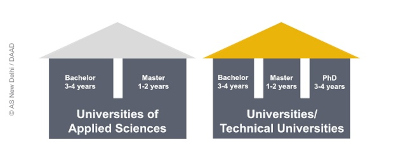
© DAAD India
Universities and Universities of Technology (TU) are research-oriented. They offer a wide variety of subjects and can award doctorate degrees.
Universities of Applied Sciences (Hochschule für angewandte Wissenschaften – HAW/FH), on the other hand, are practice-oriented and offer courses mainly in engineering, business administration, social sciences and design. These have strong links to the industry and offer interesting possibilities such as joint supervision for your master thesis, where your professor and the company can together guide you .
HAWs do not award doctoral degrees, however as a master degree holder from a HAW, you are in principle eligible to apply for PhD at a university.
Your interest and inclination should define which of the two kinds of institutions you choose!
Which is the best university in Germany?
The German answer to this question is: There is no “best university”, neither in one subject and certainly not across all subjects.
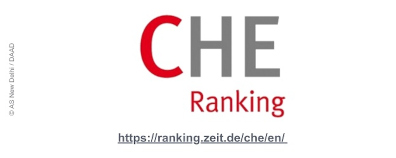
© DAAD India© DAAD/Ausserhofer/Himsel
Germany offers a multidimensional ranking, considering various criteria that are important from a student’s perspective. For example, student and staff judgments on quality of teaching, atmosphere at the university, library and other equipment, student numbers, average study duration, number of graduations, third party funding etc. This way you get a good picture of the strengths and weaknesses of each university on www.university-ranking.de. Here you can find your programme by selecting a subject, a university or even a city in Germany!
What kind of Master programmes does Germany offer?
There is wide range of study programmes with
- German as medium of instruction
- English as the sole or primary medium of instruction, called International Programmes
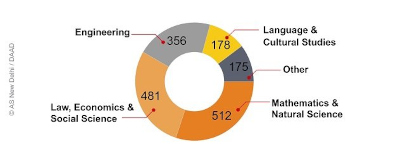
© DAAD India
You can find a comprehensive database of all study programmes, in both German and English on www.study-in-germany.de.
Eligibility and Application
It is always a good idea to check if the university’s requirements and your qualifications match. And then you can start with the application procedure.
Am I eligible to apply for a masters degree course?
In Germany, every university is autonomous. This means that every university / study programme has its own set of criteria for admitting students. So please check the university website for the programme you are interested in. Here you will find the exact admission requirements.
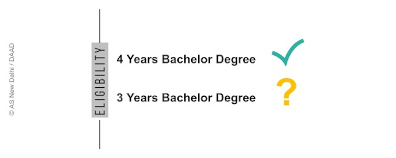
© DAAD India
However, some generalisation is possible. As a four-year Bachelor degree holder from Bangladesh, Bhutan, India, Nepal or Sri Lanka, your degree is treated at par with a German bachelor degree. Most German universities will consider you eligible for masters as long as you fulfill other criteria, if any.
In case you have a three-year Bachelor degree, do get in touch with course coordinator before applying.
Some universities may ask for your TOEFL/IELTS/GRE/GMAT scores. For example, GMAT may be asked for, if you want to study economics or law. Universities will ask for very good German language skills in case you want to take up a programme in German medium. In such case, your knowledge of German needs to be certified through examinations like the TestDaF or DSH.
How do I apply?
The German academic year is divided into two semesters: Winter semester (October – March) and summer semester (April – September). So German universities have two intakes.
The following timeline refers to courses beginning with the winter semester. In case you find a course that begins with the summer semester, just calculate the months accordingly and proceed!
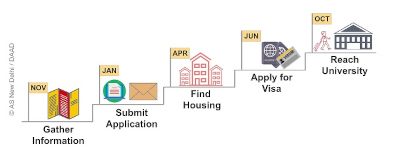
© DAAD India
Let us get into the details now:
| October – November |
|
| January – March |
|
| March – June |
|
| July |
|
| September – October |
Arrive in Germany at least a week before your course begins. Contact the International Office (Akademisches Auslandsamt) of your university for guidance. |
| October – December |
Get your residence permit within the first three months of your stay in Germany from the Foreigners’ Registration Office (Auslaenderamt). |
German or English Medium
Germany offers education in German as well as in English. Different subject fields can have different language requirements.
Can I do my Masters completely in English medium?
Germany offers close to 2000 International Programmes with English as the sole or primary medium of instruction. These programmes are called International Programmes.
Few of these programmes may require students to have learnt/learn some German language during masters.
Can I do my Masters in German medium?
You can certainly do your masters in German medium if you have the requisite German language proficiency. A comprehensive database of all study programmes, in German and English medium, is available on www.study-in-germany.de.
Must I learn German?
As a student in Germany, your life will not be limited to the university campus. You will surely want to interact with people, do your internships, travel through the country-side and make the best of your time there. You may also want to gather work experience in Germany or build your career there. This is where knowledge of German will be of great advantage for you!
Universities offer beginner and well as advanced level courses where you can learn German. You can also start learning the language while you are still in your home country at the Goethe-Instituts (Max-Mueller Bhavan) / Goethe-Zentrums.
Financials
While in a foreign country being able to manage your finances on your own is very important. You would need to plan your budget keeping your living expenses, travel costs and tuition fees if any.
Do I really not need to pay tuition fees?
In Germany, education is subsidised by the state and therefore state-funded institutions of higher education typically charge no tuition fee. So, in Germany virtually every student gets a scholarship!
Certain specialised courses and courses offered by private universities do attract fees. You will always find information about the fees in the databases provided on this page and also on the university webpages and My Guide.
You will need to pay semester contribution of around Euro 300, depending upon the university and the services or benefits provided.
What kind of budget should I have in my mind?
Apart from the tuition fees, if any, you will require about EUR 934 per month for subsistence i.e. housing, food, clothing, study material and other expenses such as health insurance and leisure activities. The precise split up for this amount will be updated soon.
The amounts can vary from city to city, and of course from lifestyle to lifestyle!
The following table shows the split up at the time of the last budget indicated in 2019.
| Rent and utilities | EUR 332 |
| Food and Drink | EUR 154 |
| Clothing | EUR 48 |
| Learning Materials | EUR 24 |
| Car and Public Transportation | EUR 116 |
| Health Insurance, Medical Costs, Medicine | EUR 96 |
| Telephone, Internet, TV | EUR 32 |
| Recreation, Culture, Sports | EUR 66 |
| Total | EUR 867 |
Source: German Student Union (Deutsches Studentenwerk), 2019
Are there any scholarships available?
Funding in Germany is typically available for research, so basically for PhD and above. However, the DAAD offers the following scholarships for master’s:
- Development-Related Postgraduate Courses (EPOS)
- Helmut-Schmidt-Programme (Master’s Scholarships for Public Policy and Good Governance – PPGG)
- Combined Study and Practice Stays for Engineers from Developing Countries (KOSPIE) with Indian IITs
To get a comprehensive overview of various funding possibilities, visit www.funding-guide.de.
Can I work in Germany as a student?
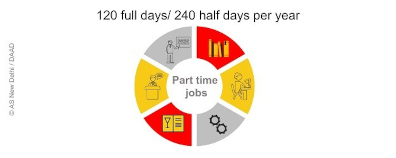
© DAAD India© DAAD/Hüttermann
As an international student, you are permitted to work for 120 full days or 240 half days in a year. This will help you in getting a bit of extra pocket-money!
Living as a Student
Living on your own comes with lots of responsibilities, at the same time it can also be very interesting. It starts with finding a place to stay, learning how to cook, shopping on a budget, making friends and connections. Hope this section helps you with some of your questions.
How do I find an accommodation?
Germany offers various types of accommodations:
- Students hall of residence: Here you can rent rooms provided by Student Services Organisation (Studentenwerk). They are low in cost and preferred by many students. Studentenwerk also provides specially designed Service Kits for international students. Get in touch with Studentenwerk of your city know more.
- Shared Flats (Wohngemeinschaft – WG): Shared flat or WG is another affordable accommodation, where you have your own room in a flat and share the kitchen and the bathroom with other flatmates. Living in a shared flat is cheaper as the rent and other expenses get shared. You can find advertisements for vacancies in WGs online on social media groups or on student-friendly websites.
- Private apartments: If you prefer living alone, private apartments can be an option for you. You can find them with the help of Studentenwerk, on boards in the university foyer or even on social media groups and websites for rental real estate.
Make sure to be on the lookout from early on, so that you find the best place at an affordable price.
How do I connect with other students?
Connecting with other students can help you to learn from their experience. It may also help you get acquainted with the lifestyle, once you are in Germany.
- Get in touch with DAAD Young Ambassadors. They have studied or carried out their research in Germany. Contact them with your questions, they will be happy to guide you!
- You can also find out about different student associations and groups formed by students of your country/region.
- You can contact and locate other students on different socials media platforms as well. There are groups based on nationalities or even interests and activities.
- In the initial weeks of your first semester many universities arrange introductory events. Ask the international office of your university about them and consider participating to get to know the university. You will hear about these events once you secure a seat at a university.
Working in Germany
You can of course work in Germany as long as you respect the regulations, which are not complex and are fairly easy to understand and follow.
Can I work in Germany as a student?

© DAAD India© DAAD/Hüttermann
As an international student, you are permitted to work for 120 full days or 240 half days in a year. This will help you in getting a bit of extra pocket-money!
Can I work in Germany after my studies?
After completing your degree in Germany, you can choose from amongst a wide range of options:

© DAAD India
You can stay on in the country for up to 18 months to look for a job that is in keeping with your education. Once you find a job, the residence permit issued to you for the purpose of studying, can be converted into a residence permit for taking gainful employment.
Germany has always had a very strong industry-academia linkage. A lot of scientific research is funded by the industry as well. During your studies you can get the opportunity to do internships with German companies, which can open new vistas for your professional career.
Get Guidance
Whether you are in India, Nepal or Bhutan, the DAAD is there to help you with your study in Germany plans. Check out how you can reach us!
My Guide
Find your way through the richness of German study programmes. Based on your academic background and interests, My GUIDE will find suitable study programmes for you. Check your entrance qualification and contact your favourite university.
Visit My Guide
Information Sessions
The DAAD offers free of cost information session about studying in Germany regularly. Check which dates and topics suit you, register and join!
Click here for dates, timings and registration links: www.daad.in/events